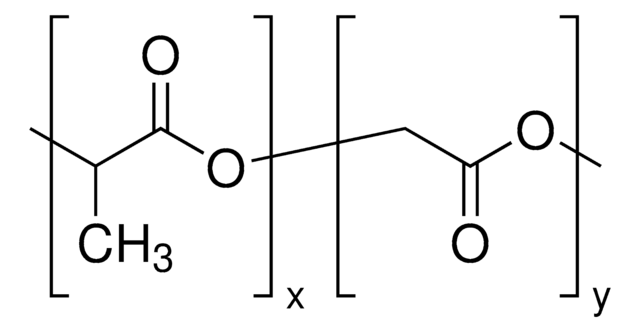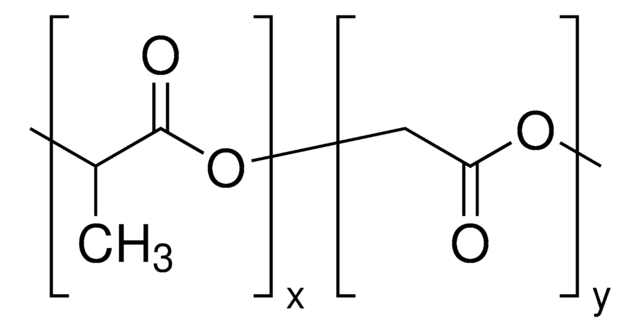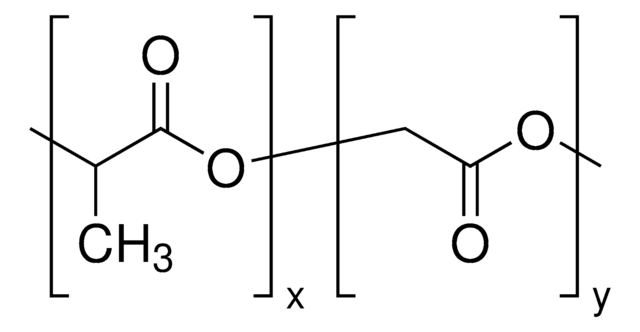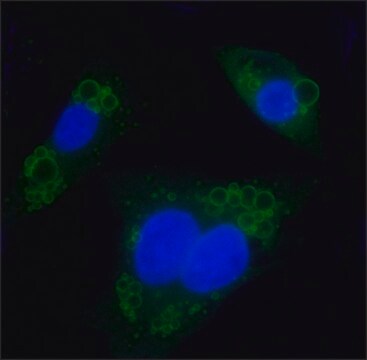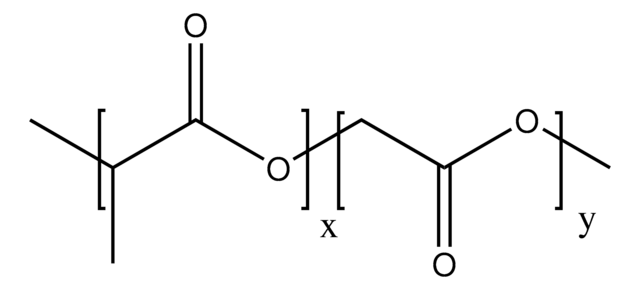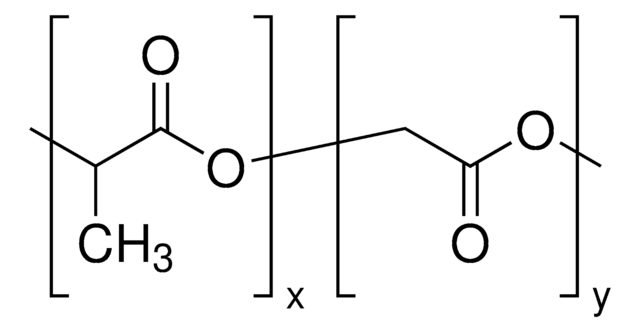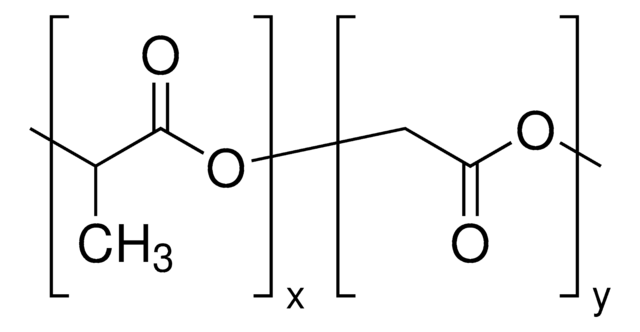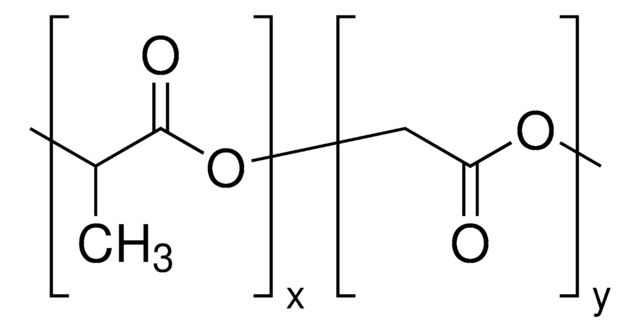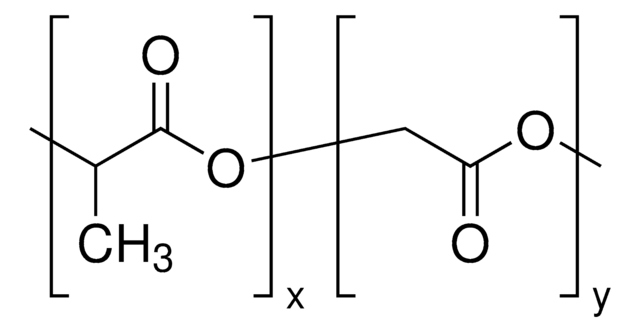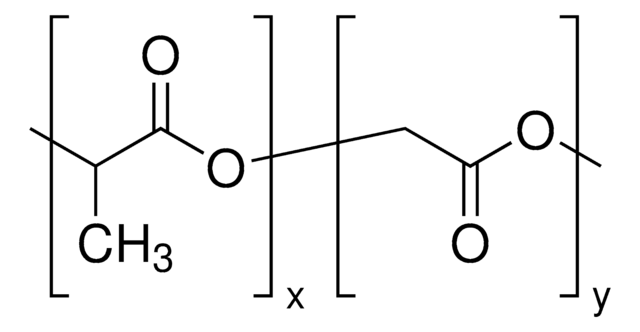P2066
Poly(D,L-lactide-co-glycolide)
lactide:glycolide 65:35, Mw 40,000-75,000
Synonym(s):
Lactel® B6001-1, PLGA
Sign Into View Organizational & Contract Pricing
All Photos(3)
About This Item
Linear Formula:
[C3H4O2]x[C2H2O2]y
MDL number:
UNSPSC Code:
12162002
PubChem Substance ID:
NACRES:
NA.23
Recommended Products
form
pellets
Quality Level
feed ratio
lactide:glycolide 65:35
mol wt
Mw 40,000-75,000
storage temp.
−20°C
SMILES string
OCC(O)=O.CC(O)C(O)=O
Looking for similar products? Visit Product Comparison Guide
Related Categories
Application
- Inhaled Macrophage Apoptotic Bodies-Engineered Microparticle Enabling Construction of Pro-Regenerative Microenvironment to Fight Hypoxic Lung Injury in Mice.: This study demonstrates the use of Poly(ᴅ,ʟ-lactide-co-glycolide) (PLGA) in engineering microparticles that promote lung tissue regeneration in hypoxic conditions, highlighting its potential in developing advanced therapeutic strategies for respiratory injuries (Liu et al., 2024).
- Engineered nanoparticles promote cardiac tropism of AAV vectors.: The research explores the role of PLGA nanoparticles in enhancing the targeting efficiency of AAV vectors to cardiac tissues, showcasing its application in gene therapy and cardiovascular disease treatment (Switala et al., 2024).
- Drug-loaded adhesive microparticles for biofilm prevention on oral surfaces.: This article reports the development of drug-loaded PLGA microparticles designed to prevent biofilm formation on oral surfaces, demonstrating the polymer′s utility in dental applications and biofilm-associated infections (Oh et al., 2024).
- Dual-layer conduit containing VEGF-A - Transfected Schwann cells promotes peripheral nerve regeneration via angiogenesis.: PLGA-based dual-layer conduits are utilized to support nerve regeneration by enhancing angiogenesis, indicating its importance in neuroregenerative medicine and peripheral nerve injury treatments (Huang et al., 2024).
- Application of Doxorubicin-loaded PLGA nanoparticles targeting both tumor cells and cancer-associated fibroblasts on 3D human skin equivalents mimicking melanoma and cutaneous squamous cell carcinoma.: The study highlights the dual-targeting capability of PLGA nanoparticles in delivering chemotherapy drugs to both tumor cells and the surrounding supportive stroma, emphasizing its role in advanced cancer therapies (He et al., 2024).
Features and Benefits
Controlled release of bioactive agents, sutures and bioabsorbable implantable devices.
Physical form
Biocompatible, biodegradable polymer.
Legal Information
Lactel is a registered trademark of Evonik Corp
Storage Class Code
11 - Combustible Solids
WGK
WGK 3
Flash Point(F)
Not applicable
Flash Point(C)
Not applicable
Personal Protective Equipment
dust mask type N95 (US), Eyeshields, Gloves
Choose from one of the most recent versions:
Already Own This Product?
Find documentation for the products that you have recently purchased in the Document Library.
Customers Also Viewed
Engineering Cell Adhesion and Orientation via Ultrafast Laser Fabricated Microstructured Substrates.
Eleftheria Babaliari et al.
International journal of molecular sciences, 19(7) (2018-07-18)
Cell responses depend on the stimuli received by the surrounding extracellular environment, which provides the cues required for adhesion, orientation, proliferation, and differentiation at the micro and the nano scales. In this study, discontinuous microcones on silicon (Si) and continuous
Rongcai Liang et al.
International journal of pharmaceutics, 454(1), 344-353 (2013-07-23)
Peptide or protein degradation often occurs when water flows into the dosage form. The aim of this study was to investigate the effect of water on exenatide acylation in poly(lactide-co-glycolide) (PLGA) microspheres. Exenatide-loaded PLGA microspheres were incubated at different relative
Shu-Chun Chuang et al.
Parasites & vectors, 6, 34-34 (2013-02-13)
Current development efforts of subunit vaccines against Toxoplasma gondii, the etiological agent of toxoplasmosis, have been focused mainly on tachyzoite surface antigen 1 (SAG1). Since microparticles made from poly (lactide-co-glycolide) (PLG) polymers have been developed as safe, potent adjuvants or
Vanna Sanna et al.
International journal of nanomedicine, 7, 5501-5516 (2012-10-25)
Resveratrol, like other natural polyphenols, is an extremely photosensitive compound with low chemical stability, which limits the therapeutic application of its beneficial effects. The development of innovative formulation strategies, able to overcome physicochemical and pharmacokinetic limitations of this compound, may
Mani Gajendiran et al.
Colloids and surfaces. B, Biointerfaces, 104, 107-115 (2013-01-10)
A series of biodegradable low molecular weight PLGA-PEG-PLGA tri-block copolymers have been synthesized in powder form. The anti-tuberculosis drug Isoniazid (INH) loaded polymeric core-shell nanoparticles (CSNPs) have been prepared by sonication followed by water-in-oil-in-water (w/o/w) double emulsification technique. The nanoparticles
Articles
Innovations in polymer technology have had a significant impact on the advancement of novel drug delivery systems.
Protocols
Preparation for biodegradable nanoparticles and their use in transfection protocols .
Our team of scientists has experience in all areas of research including Life Science, Material Science, Chemical Synthesis, Chromatography, Analytical and many others.
Contact Technical Service